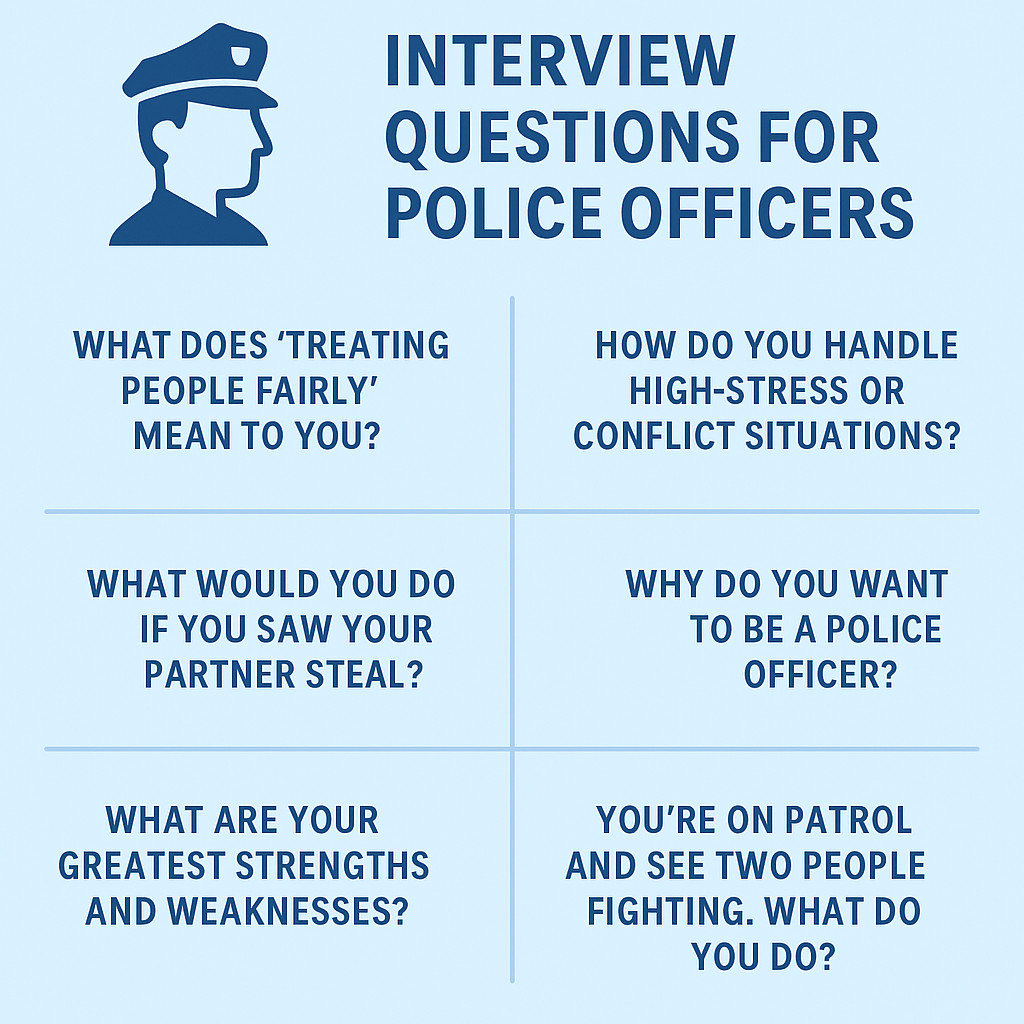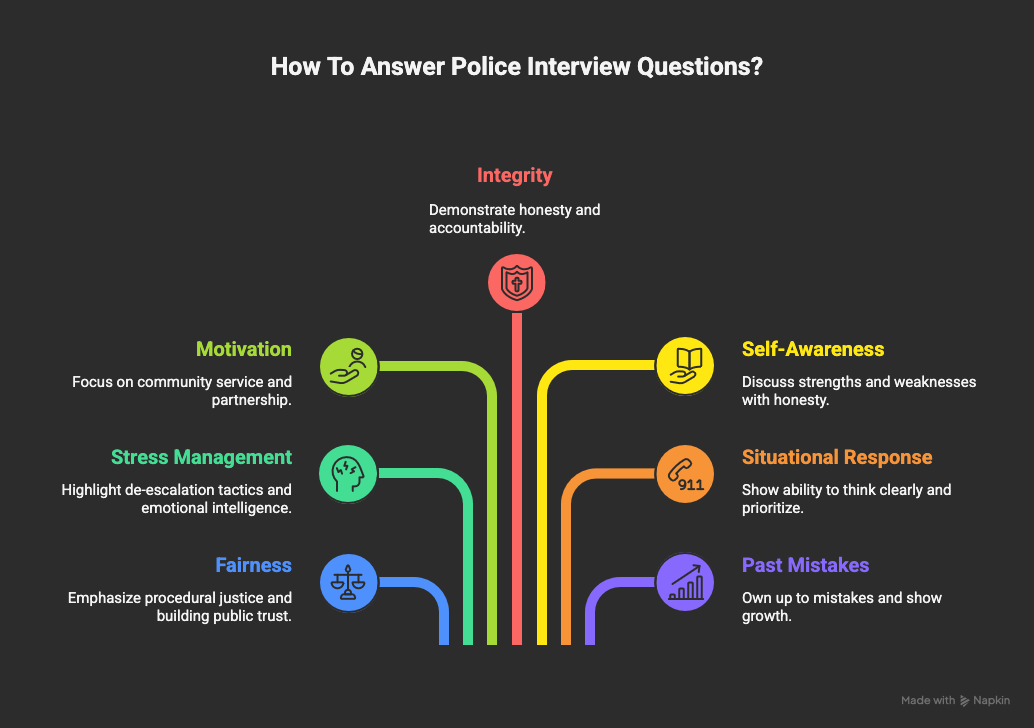How can candidates prepare to answer police officer interview questions confidently?
Police interviews go beyond testing tactical readiness—they assess judgment, ethics, and emotional intelligence. Strong candidates show fairness, accountability, and composure under pressure, using principles like procedural justice and de-escalation. By demonstrating self-awareness, empathy, and integrity, you align with modern policing values rooted in community trust and professionalism.
Preparing for law-enforcement interviews isn’t simply about demonstrating your physical or tactical readiness - it’s about showing you understand the human- and judgement-centred aspects of the job.
When facing interview questions for police officers, your answers need to reflect both skill and character, rather than just enforcement.
For example, a recent article by Police1 noted that “emotional intelligence is increasingly recognised as an essential skill in policing, giving officers the tools to manage high-pressure situations, improve communication, and foster leadership rooted in empathy and resilience.”
This means your responses in the interview should reflect fairness, accountability, and community-focused values - the hallmarks of 21st-century policing.
In this guide, we’ll break down some of the most common police interview questions, explain why they’re asked, and show you how to answer them in a way that sets you apart as a thoughtful, trustworthy candidate.
1. What does 'treating people fairly' mean to you?
The board is testing if you understand that "fairness" is an active process, not just a passive belief.
They want to see if you know the specific, modern policing concepts for building public trust and legitimacy.
Sample Answer: "To me, treating people fairly means practicing procedural justice. It's about ensuring that in every interaction, the person feels they had a voice to tell their side of the story, that I was neutral and unbiased in my decision-making, that I treated them with respect, and that I acted in a way that builds trust."
Why this works: This answer uses the four key pillars of Procedural Justice, which is a foundational concept in modern policing. It's the idea that the way you treat people is often more important than the outcome. Research highlighted by the U.S. Department of Justice shows that procedural justice increases public trust and cooperation. You're showing them you are already aligned with the core principles of 21st-century policing and building strong relationships with the community.
Also Read: How to make a police officer resume?
2. How do you handle high-stress or conflict situations?
This question assesses your emotional intelligence and judgment under pressure. They want to know if your instinct is to escalate a situation or to de-escalate it.
They are looking for candidates who are not "hotheads."
Sample Answer: "My primary goal in any high-stress call would be to actively de-escalate. I would use my training to create time and distance, use active listening to understand the person's state, and work to lower the emotional temperature. The objective is to achieve a safe, voluntary resolution."
Why this works: This answer shows you are a thinker, not just a reactor. It highlights specific de-escalation tactics ("time and distance," "active listening") that are critical to modern policing. Departments are desperate for candidates who can de-escalate.
The Police Executive Research Forum (PERF) developed the ICAT training model specifically to prioritize this. After implementing it, the Louisville Metro Police Department (LMPD) reported a 28% reduction in use-of-force incidents and a 36% reduction in officer injuries, according to Peaceful Leaders Academy.
Also Read: How to write a cover letter for police officer jobs?

3. Why do you want to be a police officer?
This is a test of your motivation. The "action" and "catch bad guys" answers are red flags that signal a "warrior" mindset. The board wants to hire "guardians" with a public service motivation.
Sample Answer: "I want to be a police officer because I believe in the mission of community policing. I want to be a stabilizing, trustworthy presence in a neighborhood, not just someone who only shows up on the worst day. I'm interested in building partnerships with the community to solve problems before they become 911 calls."
Why this works: This answer is aligned with the core pillars of modern policing. The President's Task Force on 21st Century Policing identified "Building Trust and Legitimacy" (Pillar One) and "Community Policing and Crime Reduction" (Pillar Four) as foundational, according to the American Bar Foundation's summary).
It shows you understand the role is about partnership and problem-solving, not just enforcement.
Also Read: What are some good examples of law enforcement resume templates?
4. What would you do if you saw your partner steal?
This is a black-and-white integrity test. There is no gray area. The board is testing if your loyalty is to the law and the public, or to a fellow officer. Any hesitation or attempt to "handle it yourself" is an immediate fail.
Sample Answer: "I would report it immediately, without hesitation. My integrity is non-negotiable. I understand that as a police officer, my credibility is a fundamental requirement of the job. A single lie, or covering for a lie, destroys my ability to be a credible witness, invalidates my testimony, and violates the public trust."
Why this works: This answer doesn't just give the correct response (report it), it explains why from a legal and professional standpoint. A Berkeley Law publication on police honesty states, "A deputy sheriff's job is a position of trust... Honesty, credibility, and temperament are crucial to the performance of an officer's duties." It further notes that "integrity is so important... a single lie can cost an officer his/her career." This answer proves you understand those deep implications.
Also Read: What are some of the best criminal justice jobs?
5. What are your greatest strengths and weaknesses?
The board is testing your self-awareness. For strengths, they want to see if you value the character traits of a good officer. For weaknesses, they want to see if you can be honest and show you are actively working to improve.
Sample Answer: "My greatest strength is my humility and controlled temper. The FBI's Law Enforcement Bulletin identifies these as ideal traits for an officer (according to the FBI LEB), and they allow me to de-escalate, listen, and learn. As for a weakness, I tend to be overly self-critical. I'm working on this by learning to trust my training and decision-making in the moment, and saving the in-depth review for after-action reports."
Why this works: This answer avoids the cliché "perfectionist" weakness. It links the strength directly to a credible source (the FBI) and explains how it applies to police work (de-escalation, listening). It presents a real weakness (self-criticism) but shows a mature, professional plan to manage it. You're showing you have the right skills and, more importantly, the right character for the job.
6. You're on patrol and see two people fighting. What do you do?
This is a situational question to test your ability to think clearly, prioritize, and manage a chaotic scene. They want to see if you will rush in blindly or if you will follow a safe and methodical process.
Sample Answer: "My response would follow a clear framework. First, public and officer safety: I'd call for backup and use verbal commands from a safe distance to separate the parties. Second, investigation and legal standing: I'd get statements, identify the primary aggressor, and determine if a crime occurred. Third, policy and discretion: Based on department policy and the law, I'd determine the best course of action - whether it's mediation, a citation, or a physical arrest."
This proves you can think, not just react. It shows you understand that policing is a complex task of juggling multiple priorities at once. Using a "First... Second... Third..." framework shows you are methodical, safety-conscious, and can take control of a scene.
7. I see you were fired from a job five years ago. Tell me what happened.
This is a test of your integrity, not your past. The background investigator has given them your entire file, so they already know the answer. They are testing to see if you will lie, minimize, or blame others.
Sample Answer: "Yes, that's correct. I was 22, and I was let go for being late. Frankly, I was irresponsible, and I didn't manage my time well. It was a hard lesson, but it forced me to mature. As you can see from my last five years of employment, I have never been late since. I owned the mistake, and I fixed the behavior."
Why this works: This answer demonstrates 100% honesty and accountability. As the Berkeley Law article confirms, one lie will get you disqualified faster than any past mistake. The only way to pass this question is to: Own the mistake completely (no blaming). Explain the lesson you learned. Show the changed behavior over time. This model turns a negative into a positive by proving your honesty and maturity.

Conclusion
Preparing for a police interview takes more than knowing the “right” answers - it’s about showing the mindset, integrity, and judgment every department values.
Each question is an opportunity to demonstrate your ability to stay calm under pressure, think critically, and act with fairness and respect.
If you’re working toward a law-enforcement career, make sure your preparation reflects that same professionalism.
With Hiration’s AI-powered mock interview platform, you can practice real-world questions, get instant feedback on your responses, tone, and body language, and build the confidence you need to perform at your best.
Because when the stakes are high, preparation isn’t optional, it’s what sets the right candidate apart.
Police Officer Interview — FAQ
What qualities do police departments look for in candidates?
Departments seek officers who demonstrate fairness, integrity, empathy, and sound judgment. Emotional intelligence and decision-making under pressure are valued more than physical strength alone.
How should I answer questions about handling stress or conflict?
Emphasize de-escalation, active listening, and maintaining composure. Departments favor candidates who prioritize safety and calm resolution over confrontation, aligning with ICAT training principles.
What’s the best way to explain why I want to be a police officer?
Focus on service, community trust, and proactive problem-solving. Avoid "action" or "power" motives and instead convey your interest in community policing and partnership building.
How do I discuss integrity-related scenarios, like reporting misconduct?
Be direct—always report misconduct immediately. Explain that integrity is central to credibility, as one lie can disqualify an officer or undermine testimony in court.
What’s an ideal approach to discussing weaknesses in an interview?
Show self-awareness and accountability. Choose a real area for growth—such as over-self-criticism—and describe steps you’re taking to improve, demonstrating maturity and professionalism.
How can I prepare for situational or ethical questions?
Use structured frameworks like “First–Second–Third” to organize responses. Highlight safety, legal understanding, and discretion to show balanced decision-making in complex situations.
How does Hiration help with police officer interview prep?
Hiration’s AI-powered mock interview platform helps you practice realistic law enforcement questions, get instant feedback on tone and structure, and build confidence for high-stakes interviews.



